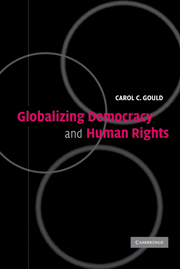Book contents
- Frontmatter
- Contents
- Acknowledgments
- Introduction: Between the Personal and the Global
- PART I THEORETICAL CONSIDERATIONS
- PART II DEMOCRACY AND RIGHTS, PERSONALIZED AND PLURALIZED
- 3 Embodied Politics
- 4 Racism and Democracy
- 5 Cultural Identity, Group Rights, and Social Ontology
- 6 Conceptualizing Women's Human Rights
- PART III GLOBALIZING DEMOCRACY IN A HUMAN RIGHTS FRAMEWORK
- PART IV CURRENT APPLICATIONS
- Index
5 - Cultural Identity, Group Rights, and Social Ontology
Published online by Cambridge University Press: 23 November 2009
- Frontmatter
- Contents
- Acknowledgments
- Introduction: Between the Personal and the Global
- PART I THEORETICAL CONSIDERATIONS
- PART II DEMOCRACY AND RIGHTS, PERSONALIZED AND PLURALIZED
- 3 Embodied Politics
- 4 Racism and Democracy
- 5 Cultural Identity, Group Rights, and Social Ontology
- 6 Conceptualizing Women's Human Rights
- PART III GLOBALIZING DEMOCRACY IN A HUMAN RIGHTS FRAMEWORK
- PART IV CURRENT APPLICATIONS
- Index
Summary
In Chapter 4, I introduced an interpretation of cultural identities, and with it a conception of intercultural societies, to suggest the importance of the diversity and interaction of cultures. Yet we can also observe that the increasing globalization and universalization of culture worldwide have paradoxically been matched by increasing cultural particularism and separatism. These two conflicting trends are reflected in cosmopolitanism or the homogenization of cultures, on the one hand, and in claims to cultural autonomy or to ethnic and nationalist chauvinisms, on the other. At the same time that sixteen-year-olds all over the world are drinking their Cokes while listening to MTV and wearing their Levis (many sizes too large), their parents and siblings are often reviving ancient ethnic feuds, rediscovering their distinctive cultural identities, and attempting to exclude alien others from their midst. Against the background of an increasing awareness of the value of cultural difference, but also in the context of the alternative claims of equal and universal freedom and global interconnectedness, the question of group rights has reemerged with particular force in recent decades and has been developed in newly sophisticated ways in social and political philosophy. What are group rights? Do we need to recognize them as a condition for preserving and enhancing cultural diversity? Are they fundamental rights, or do they instead derive from individual rights? And indeed, what do we mean when we speak of a “group” in this connection?
- Type
- Chapter
- Information
- Globalizing Democracy and Human Rights , pp. 118 - 138Publisher: Cambridge University PressPrint publication year: 2004



